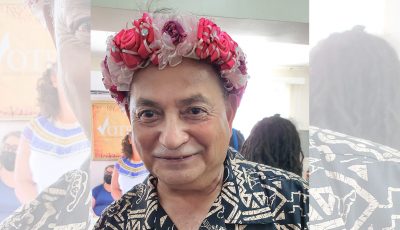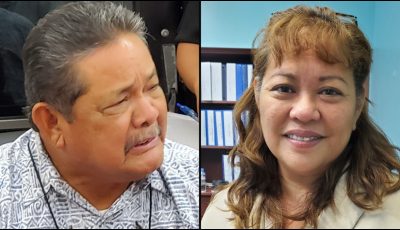JGO probe comes down to witness’ insistence on Chamorro
The insistence of a witness on having statements addressed to her be translated into Chamorro led to a tense exchange last Friday as the House Judiciary and Governmental Operations Committee continued its investigation into the expenditures of Gov. Ralph DLG Torres.
Heated arguments ensued after the witness, special assistant for administration Mathilda A. Rosario, insisted on her constitutional right to speak in Chamorro and have all questions asked of her—including all statements preceding any question—be translated to Chamorro during the JGO hearing.
When Saipan Tribune left the House chamber Friday at about 4:15pm, Rep. Christina E. Sablan (D-Saipan) was questioning Rosario about a lighter worth $1.49 that were among the items that Torres purchased and had reimbursed as shown in documents presented before the JGO.
Rosario will resume her testimony tomorrow, Tuesday, at 2:30pm. The JGO is investigating Torres and first lady Diann Torres’ travels and expenses.
The argument started when Rosario, through an interpreter, asked that Sablan’s statements prior to asking her a question be repeated for translation. Sablan said she was not addressing Rosario in the earlier part of her statement, but committee chair Rep. Celina R. Babauta (D-Saipan).
Rosario, through interpreter Florence Kirby, said she’s asking for a translation of what Sablan had said in framing a question so she can understand it.
Sablan pointed out that the question is very simple yes and no question, which Babauta also stated. “It’s a simple yes or no question,” she said.
Rosario insisted that everything is translated from what had been said from the very beginning for the question, as well as the question itself. She reiterated that she is exercising her constitutional right to have the statement prior to the question be translated in Chamorro.
Rosario’s counsel, Viola Alepuyo, who sat beside her during the hearing, said Rosario had stated that she feels more comfortable when the questions and the statements directed at her are spoken in Chamorro. “The court said it doesn’t matter whether you are proficient in English, you still have the constitutional right…,” Alepuyo said.
Sablan then said that Alepuyo is being extremely disruptive, to which Alepuyo replied that she is just making sure she’s protecting her client’s right.
After much more arguments along the same vein, Rosario said she can read, write, and speak in English, but in these proceedings she would like to exercise her right to speak in Chamorro.
Alepuyo pointed out that the CNMI Constitution Article 23 has been interpreted by CNMI courts: It doesn’t matter if the native speaker of Chamorro or Carolinian is proficient in English or not, they still have a fundamental and a constitutional right to have official proceedings done in their native language.
House of Representatives legal counsel Joseph Taijeron argued that this proceeding in the Legislature is not in the court of the CNMI. “Those rulings are relative to the Superior Court of the Commonwealth, not the Legislature. We have absolute authority to conduct our proceedings in the Legislature pursuant to the CNMI Constitution and our rule,” he said.



























